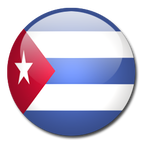International Headteacher
Menu
|
Full name: Republic of Cuba
Population: 11.2 million (UN, 2011) Capital: Havana Area: 110,860 sq km (42,803 sq miles) Major language: Spanish Major religion: Christianity Life expectancy: 77 years (men), 81 years (women) (UN) Monetary unit: 1 Cuban peso = 100 centavos Main exports: Nickel, sugar, tobacco, shellfish, medical products, citrus, coffee GNI per capita: Estimated to be upper middle income: $3,946 to $12,195 (World Bank, 2009) Internet domain: .cu International dialling code: +53 |
|
When Christopher Columbus landed on the Caribbean island of Cuba in 1492, he declared it, “the most beautiful land human eyes have ever seen.”
Today, however, Cuba faces many political and economic challenges. The country has been under a trade embargo from the United Sates since 1960, which means that U.S. citizens, U.S. companies, and foreign subsidiaries of U.S. companies are barred from doing business with Cuba (there are a few exceptions, especially in terms of humanitarian products). With its neighbor 90 miles to the north off-limits, the Cuban economy depended largely on the Soviet Union and Eastern bloc nations. The collapse of the Soviet Union hit the Cuban economy hard, but it created huge opportunities for other trading partners. Today, Cuba trades with many of the former Eastern bloc nations as well as with China and countries throughout Central America, South America, and Europe. Unless you’re an American or are working for an American company (or its subsidiary), you may find yourself heading to Cuba on business. Here’s what you need to know. Politics and government Cuba is a one-party Communist nation. Because of that, Cubans are more limited in personal rights and freedoms than in many other Western countries. Criticism of the government or government officials is punishable with time in prison, so the first rule of business etiquette in Cuba is to avoid starting conversations about politics or the government. Safe topics for business acquaintances include family, travel, the weather, etc. Greetings Business colleagues, especially those meeting for the first time, greet each other with a firm handshake and friendly eye contact. Associates who know each other well may greet each other with a kiss on the right cheek. In general, Cubans don’t practice “pat on the back” greetings and may be uncomfortable being touched in that way by a stranger. When addressing new colleagues, start by being formal. Use the person’s title – Doctor, Professor, Senor, Senora, etc. – either alone or followed by his or her last name. If the person has two last names, use only the first. Don’t use first names unless invited to do so. Punctuality It’s not unusual in Cuba to wait an hour or so for a meeting to begin. However, always start with expectation of punctuality – in other words, show up on time. Dress Due largely to the warm, humid climate, business attire for men is rather casual. You’re more likely to see cotton shirts and slacks than suits. However, Cuban men rarely wear shorts in public, so stick to long pants. Women may wear either pants or skirts/dresses but should always dress modestly. Communication Spanish is the official language in Cuba. Many business people do speak English, but it would still be wise to hire an interpreter. Interrupting someone while speaking is common and not considered to be rude. It is, however, considered rude to look away when you’re speaking to someone. Regulations and the government Almost all facets of life in Cuba – including business – are subject to government regulation. When planning a business trip to Cuba, it’s important to give yourself a long lead time to work through the red tape and protocol. The Cuban Chamber of Commerce can tell you what you need to do before and during your trip. |
information provided by www.bbcnews.co.uk & www.careeraddict.com

